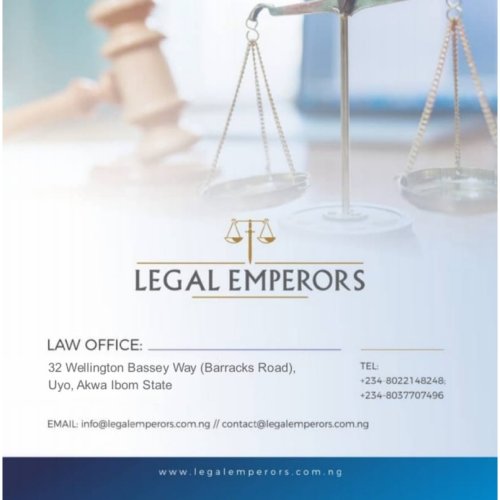Best General Litigation Lawyers in Uyo
Share your needs with us, get contacted by law firms.
Free. Takes 2 min.
List of the best lawyers in Uyo, Nigeria
Nigeria General Litigation Legal Questions answered by Lawyers
Browse our 1 legal question about General Litigation in Nigeria and read the lawyer answers, or ask your own questions for free.
- Damages claims from non payments of terminal benefits
- A new company taking over a liability ( with the terminal benefits from the former company inclusive) and refused payment for 4years plus and counting ..
-
Lawyer answer by Nomos Legal Practice
Hello and thank you for your interest to hire a lawyer to claim or receive damages from non-payments of terminal benefits for over 4 years and counting.We increase access to justice globally as we advise clients on their rights and...
Read full answer
About Litigation Law in Uyo, Nigeria
Litigation law in Uyo, Nigeria, encompasses the process and procedures involving the resolution of disputes before the courts of law. Uyo, being the capital of Akwa Ibom State, has a legal system based on the common law tradition as derived from its colonial history with England. Litigation in Uyo involves the filing and pursuit of civil lawsuits and covers a broad range of disputes including contractual, property, family, and personal injury matters, among others.
Why You May Need a Lawyer
Individuals may require legal help in litigation for various reasons. A lawyer can provide expertise on navigating the complexities of the court system, drafting and filing of legal pleadings, gathering and presenting evidence, and offering strategic advice throughout the court proceedings. Common situations where legal assistance might be necessary include:
- Business disputes involving breach of contract or partnership disagreements
- Land and property disputes, often prevalent in growing urban centers like Uyo
- Family law cases such as divorce, custody, and inheritance issues
- Personal injury claims seeking compensation for accidents or negligence
- Employment disputes, including wrongful termination and discrimination cases
Local Laws Overview
Key aspects of local laws in Uyo relevant to litigation include the Constitution of the Federal Republic of Nigeria, which guarantees access to justice and the right to a fair hearing. The state operates under the Civil Procedure Rules, which outline the formal steps for civil disputes. The Akwa Ibom State High Court has jurisdiction over most civil lawsuits in Uyo. Customary law is also recognized and may govern certain cases involving personal law matters for indigenous people. Understanding local legal nuances, such as statutory time limits for filing claims, is critical in litigation.
Frequently Asked Questions
What types of cases can be litigated in Uyo courts?
Uyo courts can entertain a variety of cases including business disputes, personal injury claims, property disputes, family law cases, among others. Criminal cases are litigated as well, though they follow a different set of procedures and laws.
How long does the litigation process take in Uyo?
The duration of litigation in Uyo can vary greatly depending on the complexity of the case, the court's workload, and whether the case is settled before going to trial. On average, it can take several months to a few years.
Can cases be settled out of court?
Yes, parties can agree to settle disputes out of court through negotiation, mediation, or arbitration. These alternative dispute resolution methods are encouraged to save time and costs.
Is representation by a lawyer mandatory?
While not mandatory, representation by a lawyer is highly advised due to the formal nature of litigation and the expertise required to navigate legal procedures effectively.
What are the costs associated with litigation?
Costs include court fees, lawyer's fees, cost of serving documents, witness fees, and other miscellaneous expenses. Many lawyers charge contingency fees for certain types of cases, while others may require retainers or hourly billing.
How can I find a reputable lawyer in Uyo?
Reputable lawyers in Uyo can be found through referrals, the local bar association, law firms, and legal directories.
Are there any time limitations for filing a lawsuit?
Yes, there are statutory limitations for filing lawsuits, known as limitation periods, which vary by case type. It's critical to consult a lawyer promptly to avoid missing these deadlines.
Can foreigners file lawsuits in Uyo?
Foreigners can file lawsuits in Uyo courts, provided that the court has jurisdiction over the matter. However, they may face additional legal complexities.
What is the role of customary courts in Uyo?
Customary courts in Uyo handle cases relating to personal law among indigenous people, such as marriage, land, and tradition-related disputes, under customary law.
Can litigation outcomes be appealed?
Yes, litigation outcomes can usually be appealed to a higher court if there are grounds to believe that there has been an error in the application of the law or in the administration of justice.
Additional Resources
For those seeking legal advice in the area of litigation, resources such as the Nigerian Bar Association, the Legal Aid Council, and the National Judicial Council may provide valuable information and assistance. The Akwa Ibom State Judiciary website also often contains resources and information pertinent to litigation in Uyo.
Next Steps
If you need legal assistance in the field of litigation in Uyo, you should:
- Gather all relevant documents and evidence pertaining to your case.
- Seek referrals or conduct research to find a reputable lawyer experienced in the area of your dispute.
- Schedule a consultation with a lawyer to discuss the merits of your case, potential strategies, and cost implications.
- If you cannot afford a lawyer, consider reaching out to the Legal Aid Council for assistance.
- Familiarize yourself with the litigation process and ask your lawyer to keep you informed at each stage of the proceedings.
Lawzana helps you find the best lawyers and law firms in Uyo through a curated and pre-screened list of qualified legal professionals. Our platform offers rankings and detailed profiles of attorneys and law firms, allowing you to compare based on practice areas, including General Litigation, experience, and client feedback.
Each profile includes a description of the firm's areas of practice, client reviews, team members and partners, year of establishment, spoken languages, office locations, contact information, social media presence, and any published articles or resources. Most firms on our platform speak English and are experienced in both local and international legal matters.
Get a quote from top-rated law firms in Uyo, Nigeria — quickly, securely, and without unnecessary hassle.
Disclaimer:
The information provided on this page is for general informational purposes only and does not constitute legal advice. While we strive to ensure the accuracy and relevance of the content, legal information may change over time, and interpretations of the law can vary. You should always consult with a qualified legal professional for advice specific to your situation.
We disclaim all liability for actions taken or not taken based on the content of this page. If you believe any information is incorrect or outdated, please contact us, and we will review and update it where appropriate.









